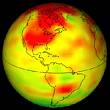 Close Topic Options
Close Topic OptionsGlobal Warming: Natural Or Man-made? - Page 62 of 71
Insane graphs show weather is ‘upside down’. - Page 62 - Politics, Business, Civil, History - Posted: 27th Feb, 2018 - 10:31pm
 Global warming has been in and out as the "latest" hot topic for many years. It is, according to modern scientists, the result of man-made industrial pollutants, clearing forested areas, agriculture, etc. But now they are thinking it started way before the Industrial Revolution...
Global warming has been in and out as the "latest" hot topic for many years. It is, according to modern scientists, the result of man-made industrial pollutants, clearing forested areas, agriculture, etc. But now they are thinking it started way before the Industrial Revolution...Global Warming: Natural Or Man-made? - Page 62
Rise in severity of hottest days outpaces global average temperature increase. While our planet's average annual temperature has increased at a steady pace in recent decades, there has been an alarming jump in the severity of the hottest days of the year during that same period, with the most lethal effects in the world's largest cities. Source 8a.
Man-made Natural Warming Global
Our planet cares nothing for us, and will eventually correct the damage we’ve done, even if it has to happen by our extinction. We have to step up as a unified globe to stop some countries rampant destruction before it’s too late. The number of weather records being broken this past few months alone should be a wake up call.
Global Warming: Natural Or Man-made? History & Civil Business Politics
How to reduce heat extremes by 2-3 degrees Celsius. New research shows how simple, proven geo-engineering measures can reduce the hottest days by 2-3 degrees C. Lightening buildings, roads and infrastructure in densely populated areas and changing crop types and using no till agricultural practices over farmland can all take the edge off the hottest days as climate change raises extreme temperatures. Source 7p.
Page 62 Man-made Natural Warming Global
Reduced energy from the sun might occur by mid-century: Now scientists know by how much. The Sun might emit less radiation by mid-century, giving planet Earth a chance to warm a bit more slowly but not halt the trend of human-induced climate change. Source 9o.
Man-made Natural Warming Global
Stop gap measures are not enough. Governments have to commit world-wide to reducing our emissions, and this means stopping trade with countries that do nothing to preserve our environment. Bit by bit, we can recover, but climate change is going to get far worse before it gets better. There was a triple tornado in the prairies in 2013, and that's just a taste of what is coming up.
 TOPIC: Global Warming: Natural Or Man-made?
TOPIC: Global Warming: Natural Or Man-made?